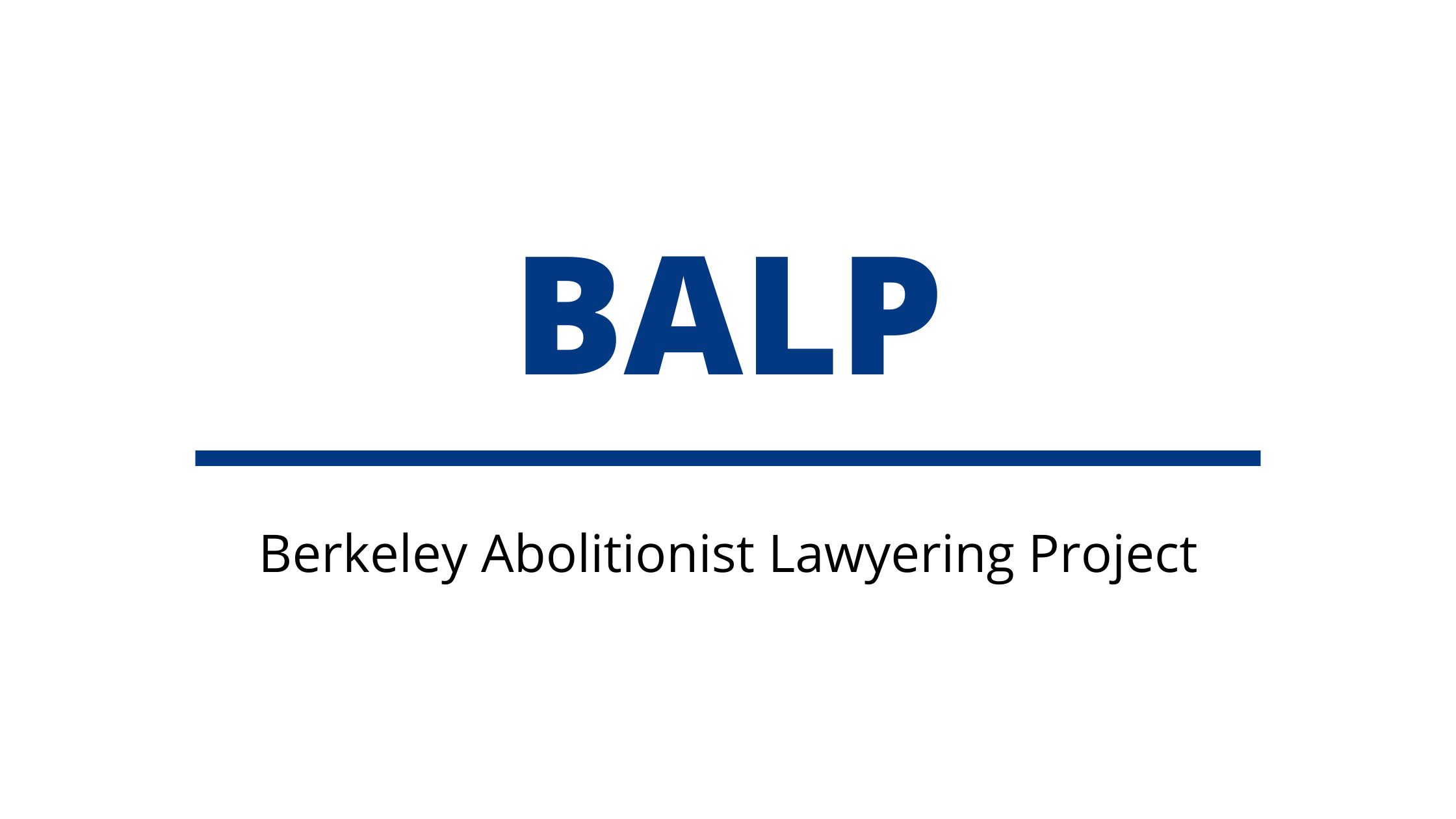
The purpose of this project is to support the work of Anti Police-Terror Project (APTP) through directed, legal-oriented research projects. This project is part of a larger interdisciplinary research effort to Reimagine Community Safety. As members of the SLP, law students will be contributing to the work of The Reimagination Lab. Housed in the Department of African American Studies at UC Berkeley, The Reimagination Lab provides research-based recommendations to organizers who are on the frontlines of building community-led visions of safety, well-being, and justice in the Bay Area. The Lab is led by James Burch, Anti Police-Terror Project (APTP) Policy Director and inaugural member of the City of Oakland’s “Reimagining Public Safety Task Force” and Professor Nikki Jones, H. Michael and Jeanne Williams Department Chair in African American Studies and Director of the Abolition Democracy Initiative. The Lab is inclusive of an interdisciplinary working group of UC Berkeley student researchers and scholars in the School of Public Health, School of Social Welfare and the Othering and Belonging Institute who are committed to community-engaged research. The Lab is a Black and organizer-led hub dedicated to leveraging a diversity of skills to synthesize and share research-driven models for community safety without policing. The work of the Reimagination Lab is currently supported by the UC Berkeley Department of African American Studies’ Abolition Democracy Initiative, The William T. Grant Foundation, and Spencer Foundation.
The goals of The Reimagination Lab are three-fold:
- To build an organizer-led interdisciplinary research base that can inform local efforts to reduce police budgets and reinvest in communities disproportionately surveilled, punished, and imprisoned.
- To bridge the institutional divide between UC Berkeley faculty and students, community members, and organizers together through working groups, public events, publications, and multimedia projects that will advance an accessible abolitionist analysis and promote community safety and accountability outside of the criminal legal system.
- To build the holistic capacity and invest in the wellness of community members directly-impacted by police violence (including families and loved ones) and frontline organizers to make legislative and policy interventions that advance our police-free
The research and efforts of SLP members constituting the law school contingent will contribute to the overarching goals of The Reimagination Lab. The work produced by students will directly support APTP’s campaigns and organizing strategies to fight police terror in Oakland. Community-based organizations like APTP engage in a diverse array of organizing tactics from advocacy to direct action to supporting legislative campaigns. In and through this type of community-engaged work, all sorts of legal questions emerge. Students will be using all institutional and legal tools available to fight back against police terror in Oakland and beyond.
While APTP does have organizers on staff, most of the labor that fuels the organization is on a volunteer basis. In this regard, the capacity of the organization to engage in critical research projects is limited. When legal or doctrinal questions emerge that require specialized knowledge and training to answer, law students have the opportunity to practice their research skills by providing answers and solutions that are of immediate value to the organization. This is fundamentally the work of movement lawyering–to be responsive to the legal needs of grassroots organizations as they emerge and evolve. Working under the direction of APTP, students will have a unique opportunity to learn about abolitionist approaches to the law. In the context of a movement to defund the police, SLP members will work to answer the most pressing legal questions identified by organizers.
There are very few legal services organizations geared explicitly toward movement lawyering. The only legal counsel that APTP has is their staff attorney, who is also our supervising attorney, James Burch. The work of students in the SLP will therefore be instrumental in supporting James and the organization more broadly.
Because the work of APTP is varied and on-going, and the SLP is part of a larger interdisciplinary research group, there is guaranteed to be relevant work to pursue for the foreseeable future. The Reimagination Lab is currently in the process of soliciting input from community and campus stakeholders to understand how it can best support students at UC Berkeley and community-driven research in the Bay Area over at least the next three years.
Supporting the implementation of SB2: Police Decertification Bill
In October 2021, Governor Newsom signed SB2: the Police Decertification Bill, which established a process to decertify law enforcement officers that have engaged in serious misconduct. SLP students will be conducting research to identify a list of officers eligible for decertification. This research will involve identifying officers named as a party in civil law suits, or officers that have been formally disciplined by any judicial proceeding or administrative body. Beginning with the Oakland Police Department, students will compile a list of officers eligible for decertification along with the findings associated with each officer. Upon completion of the Oakland Police Department, students will move on to other cities in the Bay Area and across the State of California.
Supervision: Students will be directed by supervising attorney, James Burch. James Burch is also the Policy Director for Anti-Police Terror Project.
Time Commitment: The estimated number of hours per week is about 2-5, which would be about 40-60 hours over the course of a semester.
For more information, please contact the student leaders at abolitionistlawyering@berkeley.edu.